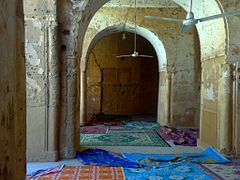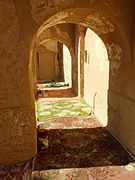
Gonabad is a city in the Central District of Gonabad County, Razavi Khorasan Province, Iran, serving as capital of both the county and the district.

The Jameh Mosque of Nain is the congregational mosque of Nain, Isfahan province, Iran. The Nain Mosque, located in the ancient city of Nain, Iran, is a historically significant and architecturally noteworthy Islamic structure that dates back to the 9th century during the Buyid dynasty. Renowned for its intricate plasterwork, stucco carvings, unique minaret, and harmonious blend of traditional Persian design with contemporary innovations, the mosque serves not only as a place of worship but also as a cultural and community hub in the region. Its design reflects the artistic and engineering skills of its time, contributing to its status as a vital piece of Iran's architectural heritage and attracting scholars and tourists alike. Historically, Nain has been a key location along the Silk Road, facilitating trade and cultural exchanges that have shaped its diverse influences over the centuries. The mosque embodies these historical layers, showcasing elements of both pre-Islamic Zoroastrian culture and Islamic architectural evolution, thus highlighting its importance as a symbol of the area's rich cultural tapestry. Although the mosque is one of the oldest in Iran, it is still in use and is protected by Iran's Cultural Heritage Organization.

The Jāmeh Mosque of Borujerd is a congregational mosque (Jāmeh) in Borujerd, in the province of Loristan, western Iran. The mosque is the oldest mosque in the Zagros area and western Iran. It ranks as No. 228 in the Inventory of National Artefacts of Iran.

The Jāmeh Mosque of Isfahān or Jāme' Mosque of Isfahān, also known as the Atiq Mosque and the Friday Mosque of Isfahān, is a historic congregational mosque (Jāmeh) of Isfahan, Iran. The mosque is the result of continual construction, reconstruction, additions and renovations on the site from around 771 to the end of the 20th century. The Grand Bazaar of Isfahan can be found towards the southwest wing of the mosque. It has been a UNESCO World Heritage Site since 2012. It is one of the largest and most important monuments of Islamic architecture in Iran.

The Jāmeh Mosque of Yazd is the grand, congregational mosque (Jāmeh) of Yazd city, within the Yazd province of Iran. The mosque is depicted on the obverse of the Iranian 200 rials banknote.
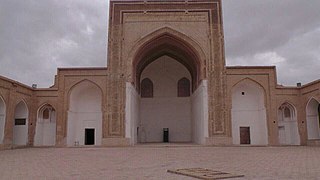
The Jāmeh Mosque of Ferdows is the congregational mosque (Jāmeh) of Ferdows, South Khorasan province, Iran. The mosque is located towards the southwest of city, in the center of the city of Toon.

The Jāmeh Mosque of Zanjān also known as, Seyyed Mosque and Sultani Mosque, is the grand, congregational mosque (Jāmeh) of Zanjān city, Iran. The mosque is situated in the old part of the city and was constructed in 1826 during the Qajar era.

The Jameh Mosque of Saveh is a Seljuk-era mosque, located in Saveh, Iran. This monument was built in the 12th century, coinciding with the establishment of the city itself.
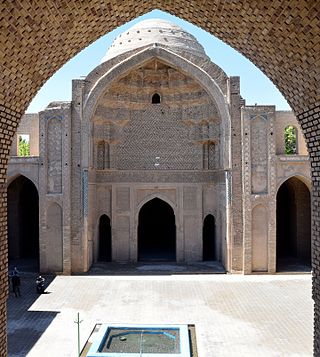
Jāmeh Mosque of Varāmīn, Congregation mosque of Varamin, Friday mosque of Varamin or Grand mosque of Varamin is the grand congregational mosque of Varamin in the Tehran province of Iran. This mosque is one of the oldest buildings of Varamin city. Its construction began during the reign of Sultan Mohammad Khodabaneh and was completed during his son's, Abu Sa'id Bahadur Khan, rule in 1322. This building consists of a shabestan, portico, large brick dome, the structure beside shabestan and ten small arches along with one large arch in the middle.
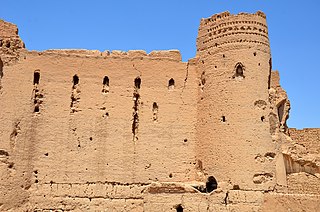
Fahraj is a village in Fahraj Rural District of the Central District of Yazd County, Yazd province, Iran.

The Jāme Mosque of Urmia, also known as the Rezayieh Mosque, is the grand, congregational mosque (Jāme) of Urmia, Iran. The mosque is situated in the older part of the city and was constructed in 13th century during the Ilkhanate era.

The Jameh Mosque of Golpayegan is one of the important mosques of the Seljukid era and one of the large mosques in Iran. In view of its construction date, it may be said that its Iranian Islamic architecture was a model for building other large mosques specially the mosques, which were in the territory of seljukid dynasty. This mosque is located in the Masjed Jameh street in Golpayegan.

Jāmeh Mosque of Zavareh, is the congregational mosque (jāmeh) of the city of Zavareh in the Iranian desert in a climate that is considered hot and dry. It is also located 15 kilometers north of Ardestan. The mosque was ordered to be constructed by Abu Tahir Husayn ibn Ghali ibn Ahmad. Two dates are associated with this mosque. First, an inscription indicating the date 1135 and work of Abu Tahir was found on the courtyard façade and second, an inscription on the eastern side of the south iwan dates the mihrab to 1156. Hence, it is plausible that the mosque was built some time between 1135 and 1156. The mosque is famous for its plan and for its brick and stucco work making it a site of historical and cultural significance to Iran.

Jameh Mosque of Sari is related to the Qajar dynasty and is located in Sari, the district of Chinarban. The Jameh Mosque of Sari is located in Nargesiye daily market in Chenarbon district in Sari, the capital city of Mazandaran Province, in North of Iran. It dates back to pre-Islam era and used to be a fire-temple of Zoroastrians of Iran in the North, next to the Caspian Sea. After the acceptance of Islam by the people in the region, a mosque, known as Jameh Mosque, was constructed on the site of the temple. It is the first mosque built in the North of Iran.

The Jameh Mosque of Babol is related to the Qajar dynasty and is located in Babol, near the cultural Intersection.

Jameh Mosque of Bandar Abbas or Jameh Mosque of Delgosha is one of the oldest mosques in Bandar Abbas, the capital of Hormozgan province in southern Iran.

Jameh Mosque of Tehran is the oldest mosque in Tehran, with its oldest Shabestan, more than a thousand years old, and is also known as the Atiq Mosque.
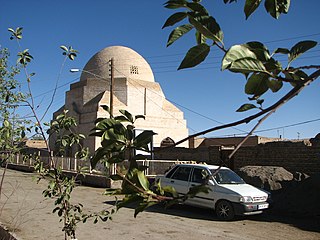
Jameh Mosque of Sojas belongs to the Seljuq dynasty and is located in the Khodabandeh County, Sojas.


